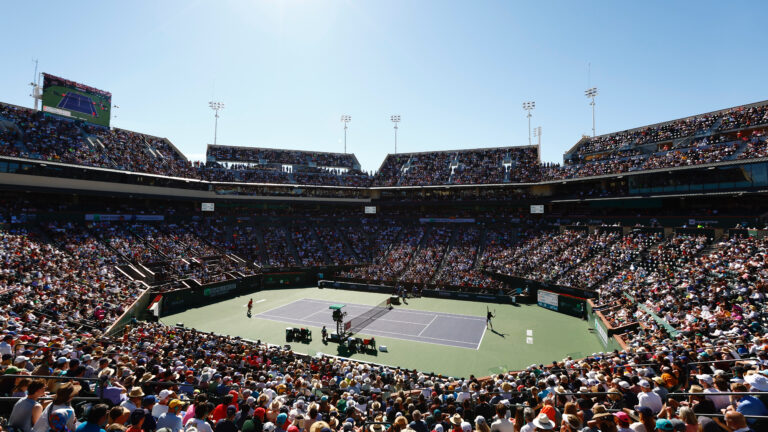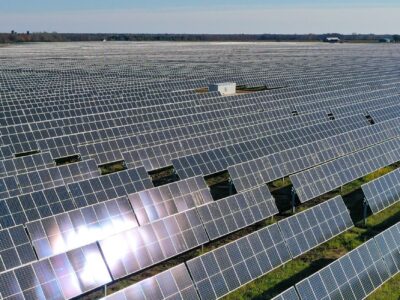When you include the word “Garden” in your name, it suggests that you hold some respect for the environment. The Indian Wells Tennis Garden (IWTG) not only states its mission is to “prioritize environmental efforts,” but the IWTG also has actively worked to create a “sustainable tennis paradise” and “demonstrate for others what it means to operate sustainably.”
Located in Southern California between Palm Springs and Coachella, the world-renowned tennis center is home to the BNP Paribas Open, the largest two-week combined tennis tournament, excluding tennis’ four Grand Slams events. The Open offers a prime example of the “green” projects involving IWTG.
Over the past few years, the Open also has conducted an “Aces For Trees” program, where trees are planted for every ace served by a player and for social media posts tagged with #Aces4Trees and @bpparibas.
The program is done with the American Forest Foundation to boost carbon storage and sustainable wood supplies, along with protecting wildlife habitats and clean water sources.
In 2021, for example, the “Aces For Trees” campaign resulted in 2,500 trees being planted. Additionally, the Open has been finding new homes for its eventscape flowers after the two-week tournament concludes, either by holding plant sales or donating to area nurseries.

Photo Courtesy bnpparibasopen
Food waste has been reduced through donations and increased composting efforts; for instance, 1,800 pounds of food were donated, and more than 9.9 tons of compost at the 2021 tournament.
Concession stand waste has been minimized, too, through the use of 100% recyclable or compostable food packaging, including 18 different compostable concession food and carry trays. The event also switched to 100% compostable single-use cups and plates in the luxury suites.

Photo Courtesy bnpparibasopen
Measures were instituted to decrease paper usage and printed materials at the 2021 Open, such as switching to digital tickets and parking passes. Similarly, all the tournament’s natural kraft and plastic retail bags are reusable, recyclable, and biodegradable. The plastic bags also started containing an ingredient that facilitated faster biodegradation in the 2022 event.
When the Open is happening, a crew sorts through the trash daily to find items suitable for recycling or repurposing. The tennis center aims to improve this process by doubling the number of recycling bins available during the tournament, with the receptacles being clearly marked to improve recycling efficiency. Signage and similar marketing tools are key components in IWTG’s plans to up sustainability awareness among the public.
Even before these initiatives started rolling, the IWTG had another major recycling program at the Open. In 2008, the venue and the BNP Paribas Open teamed up with the reBounces, a company that recycles tennis balls.
Initially, it was held as a one-day event to collect and recycle tennis balls. After a half-dozen years, the recycling campaign grew to encompass all four tournament days, along with various other tennis facilities around Southern California. Moreover, Open attendees were able to get a can with three new tennis balls if they donated six old tennis balls.
Energy efficiency is another primary pillar of the Indian Wells Tennis Garden’s sustainability mission. The buildings have been designed to lower electrical usage. A mid-2010s renovation included several additions that conserved energy.

Photo Courtesy bnpparibasopen
“For the sports lighting, we have step-down control so they don’t have to run the lighting systems non-stop at full blast,” explained Brian Hahnlen, lighting designer for Glumac, the global building design consulting firm involved in this renovation.
“For the landscape lighting, the controls were tuned to leave the ambient up-lighting off and the down-lighting at 50% when they don’t need it,” he continued. “All of those things are layered into the control system, saving energy that would have otherwise been wasted in a comparable facility.”
Since 2021, electricity-saving LED lighting has been used exclusively throughout the Tennis Garden.
Furthermore, the tennis stadiums at IWTG have been classified as “energy efficient” by the California Energy Commission in its last two evaluations (2019 and 2022).
The tournament’s title sponsor, BNP Paribas, an international financial service giant, also has an impressive pro-environment track record. In 2011, the firm launched restrictive financing and investment policies in the climate-vulnerable sectors, such as coal, oil, and gas.

Photo Courtesy bnpparibasopen
It also has helped fund research to protect coral reefs while ceasing to fund fuel-related projects based offshore the Arctic and the Arctic National Wildlife Refuge. Over the past few years, BNP Paribas has supported efforts promoting biodiversity and established policies to combat deforestation in the Amazon and other threatened areas in South America.
The environment, arts, and social inclusivity represent the three primary focal points for the BNP Paribas Foundation, which donates more than 40 million euros to causes annually.





